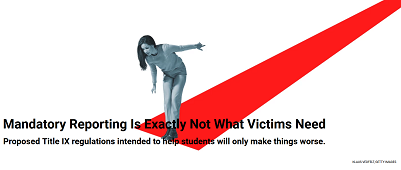
Trauma robs the victim of a sense of power and control over her own life; therefore, the guiding principle of recovery is to restore power and control to the survivor. She must be the author and arbiter of her own recovery. . . . Many benevolent and well‐intentioned attempts to assist the survivor founder because this fundamental principle of empowerment is not observed. No intervention that takes power away from the survivor can possibly foster her recovery, no matter how much it appears to be in her immediate best interest. (Herman, 2002)
In the years between 2011 and the present time, many American universities rolled out policies compelling faculty report to college officials student disclosures of sexual violence. I became concerned about these compelled disclosure policies (often known as "mandatory reporting" or "required reporting" policies) from a research and policy perspective. I first published my concerns about compelled disclosure in a 2016 commentary in which I identified serious problems with compelled disclosure and I offered the core of an alternative policy that subsequently informed the University of Oregon's reporting policy adopted in 2017. If you read just one thing about this topic, I hope it is this:
The Problem with “Required Reporting” Rules for Sexual Violence on Campus by Jennifer Freyd, Huffington Post Blog, 25 April 2016.
A trauma-informed and research-based reporting policy is central to the goal of addressing sexual violence and is an essential step of institutional courage. For more on steps of institutional courage see Resources for Changemakers at the Center for Institutional Courage.
A University’s Widely Hailed Alternative to Mandatory Reporting Ends With New Title IX Rule by Alex Walters, The Chronicle of Higher Education, 2 August 2024.

The comment period is now over but you can read about it:
1. Start here for an overview: Mandatory Reporting Is Exactly Not What Victims Need by Kathryn J. Holland, Jennifer J. Freyd, and Elizabeth A. Armstrong, The Chronicle of Higher Education, 22 July 2022.
2. And this is very informative too: Rule change for reporting sexual misconduct could hurt grad students and others, by Katie Langin, Science, 9 August 2022. A version of this story appeared in print in Science, Vol 377, Issue 6607, pages 697-698.
4. If you want to read the proposed new rules (700 pages) you can find them here.
6. Here is my Comment that I submitted on 7 September 2022.
7. Here is a Comment that I co-signed from the National Academies Leadership and Advisory Groups for the Action Collaborative on Preventing Sexual Harassmentin Higher Education.
8. Here is the AAUP Comment, recommending the University of Oregon policy as a model.
As of September 2017, most faculty and staff at the UO are not mandatory reporters but they are required to support and respect students who disclose an abuse experience. If you are seeking information about the UO's policy see:
A new national faculty advocacy group formed to explore alternatives to mandatory reporting has formed: Academic Alliance for Survivor Choice in Reporting Policies
At the National Academy of Science’s 2nd Public Summit of the Action Collaborative on Preventing Sexual Harassment in Higher Education there was a panel discussion about mandatory reporting, Finding Common Cause Centering Survivors in Reporting Policies. Video recordings of the presentations and slides are available for the public.
The American Psychologist has published in the February/March 2019 issue a comment and our response to our 2018 article "Compelled disclosure of college sexual assault."
Comment: Newins, A. R. (2019). Ethical considerations of compelled disclosure of sexual assault among college students: Comment on Holland, Cortina, and Freyd (2018). American Psychologist, 74(2), 248-249. http://dx.doi.org/10.1037/amp0000363
Our Response: Holland, K. J., Cortina, L. M., & Freyd, J. J. (2019). Advocating alternatives to mandatory reporting of college sexual assault: Reply to Newins (2018). American Psychologist, 74(2), 250-251. http://dx.doi.org/10.1037/amp0000415
The American Psychologist, the official peer-reviewed scholarly journal of the American Psychological Association, published in April 2018 our analysis of mandatory reporting policies.
Holland, K. J., Cortina, L. M., & Freyd, J. J. (2018). Compelled disclosure of college sexual assault. American Psychologist. 73(3), 256-268. http://dx.doi.org/10.1037/amp0000186 ; Press Release
(This paper was selected for the Distinguished Publication Award, Association for Women in Psychology, 2019)
Professor Merle Weiner from the University of Oregon School of Law has written an important legal analysis:
Merle H. Weiner, A Principled and Legal Approach to Title IX Reporting, 85 Tenn. L. Rev. 71 (2017). Available on Westlaw. The published version is also on SSRN: https://papers.ssrn.com/sol3/papers.cfm?abstract_id=3133270
On 12 April 2017 there was again unanimous support by the University of Oregon Senate for our new proposed reporting policy that does NOT make most employees mandatory reporters but instead obligates them to provide information, support the students and follow the wishes of the survivor/student. (Here is more about the task force that proposed the policy.) On 23 May, the university president signed this policy effective 15 September 2017. We also hope this policy can serve as a model for other campuses and organizations -- one in which we shift the focus from required reporting to required supporting. [See 2022 update above for current links to the policy.]
National News
UO Campus Specific News
Video: Student-Directed Sexual Violence Reporting Policy Approved, 12 April 2017, University of Oregon Senate (16 mins) (also see Video of University of Oregon Senate, 18 May 2016 when mandatory reporting was rejected.)
National & International Organizations
Campus Specific Organizations

Section from commentary by Freyd, 2016
Note: This list was mostly compiled in 2015 and 2016 and may be out of date.
This page is Copyright Jennifer J. Freyd.